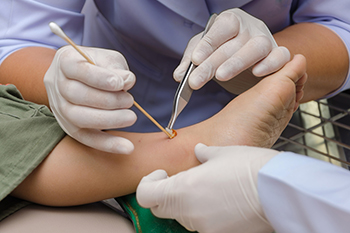Understanding Debridement for Diabetic Foot Ulcers
Tuesday, 03 December 2024 00:00
Diabetic foot ulcers are open sores or wounds that can develop on the feet of individuals with diabetes due to poor circulation and nerve damage. These ulcers can become chronic, slow to heal, and prone to infection if left untreated. An important treatment for managing diabetic foot ulcers is debridement, a process where dead or infected tissue is carefully removed from the wound. Debridement is essential because it stimulates healthy tissue growth, reduces the risk of infection, and promotes faster healing by allowing the body’s natural repair processes to function effectively. By removing dead tissue, debridement helps improve blood flow to the area, which is vital for recovery in diabetic patients with circulation issues. If you suffer from diabetic foot ulcers, it is suggested that you schedule appointments with a podiatrist for regular debridement, to prevent complications, avoid further tissue damage, and ultimately protect the foot from severe infection or amputation.
Wound care is an important part in dealing with diabetes. If you have diabetes and a foot wound or would like more information about wound care for diabetics, consult with Dr. Steven Schwartz from Pennsylvania. Our doctor will assess your condition and provide you with quality foot and ankle treatment.
What Is Wound Care?
Wound care is the practice of taking proper care of a wound. This can range from the smallest to the largest of wounds. While everyone can benefit from proper wound care, it is much more important for diabetics. Diabetics often suffer from poor blood circulation which causes wounds to heal much slower than they would in a non-diabetic.
What Is the Importance of Wound Care?
While it may not seem apparent with small ulcers on the foot, for diabetics, any size ulcer can become infected. Diabetics often also suffer from neuropathy, or nerve loss. This means they might not even feel when they have an ulcer on their foot. If the wound becomes severely infected, amputation may be necessary. Therefore, it is of the upmost importance to properly care for any and all foot wounds.
How to Care for Wounds
The best way to care for foot wounds is to prevent them. For diabetics, this means daily inspections of the feet for any signs of abnormalities or ulcers. It is also recommended to see a podiatrist several times a year for a foot inspection. If you do have an ulcer, run the wound under water to clear dirt from the wound; then apply antibiotic ointment to the wound and cover with a bandage. Bandages should be changed daily and keeping pressure off the wound is smart. It is advised to see a podiatrist, who can keep an eye on it.
If you have any questions, please feel free to contact our offices located in Chambersburg, and Mcconnellsburg, PA . We offer the newest diagnostic and treatment technologies for all your foot care needs.

